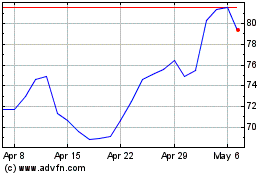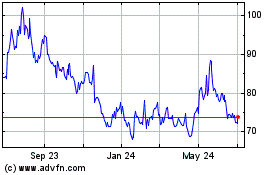Apple 'Deeply Apologetic' Over Account Hacks in China
October 16 2018 - 8:25AM
Dow Jones News
By Yoko Kubota
BEIJING-- Apple apologized over the hacking of some Chinese
accounts in phishing scams, almost a week after it emerged that
stolen Apple IDs had been used to swipe customer funds.
In its English statement Tuesday, Apple said it found "a small
number of our users' accounts" had been accessed through phishing
scams. "We are deeply apologetic about the inconvenience caused to
our customers by these phishing scams," Apple said in its Chinese
statement.
The incident came to light last week when Chinese mobile-payment
giants Alipay and WeChat Pay said some customers had lost
money.
The victims of the scams, Apple said Tuesday, hadn't enabled
so-called two-factor authentication--a setting that requires a user
to log in with a password and a freshly-generated code to verify
their identity.
The Cupertino, Calif.-based company didn't specify how many
users were hit or how much money was stolen, nor did it offer
details about how the hackers acquired the users' Apple IDs and
passwords. To help prevent unauthorized access to their accounts,
Apple said, people should enable two-factor authentication.
An Apple ID refers to the account used to access Apple services
such as its App Store and iCloud. It includes information such as
the user's email address, password and payment details, according
to Apple's website.
China is a key market for Apple and the fraud is the latest
challenge it is facing in an area where its share of the smartphone
market has been treading water.
As the U.S.-China trade battle escalates, Apple is particularly
exposed--most of its products are assembled in China. Still, it has
so far avoided a major hit and there have been no signs of boycotts
of American goods, though some major U.S. brands are vulnerable
should tensions ramp up.
The hacking incident received broad media coverage in China,
including detailed reports by state broadcaster CCTV that included
victims saying they lost money to App Store purchases they didn't
make. The broadcaster urged the companies to be more
responsive.
Many consumers in China connect their Apple accounts to
online-payment systems, including those run by Alipay, the payments
affiliate of e-commerce giant Alibaba Group Holding Ltd., and
WeChat Pay, owned by rival Tencent Holdings Ltd.
A spokesman for Alipay, owned by Ant Financial Services Group,
said the company had no additional comments beyond the previous
online warning. Tencent didn't immediately respond to a request for
comment.
Apple has come under recent scrutiny in China over its approach
to data privacy and security. In February, Apple started shifting
the iCloud accounts of its China-based customers to the servers of
a state-owned local partner, a move made to comply with Chinese
law. It has also said it would store the encryption keys for those
accounts in a secure location in China while retaining control over
them.
Yang Jie in Beijing and Stella Yifan Xie in Hong Kong
contributed to this article.
Write to Yoko Kubota at yoko.kubota@wsj.com
(END) Dow Jones Newswires
October 16, 2018 08:10 ET (12:10 GMT)
Copyright (c) 2018 Dow Jones & Company, Inc.
Alibaba (NYSE:BABA)
Historical Stock Chart
From Mar 2024 to Apr 2024

Alibaba (NYSE:BABA)
Historical Stock Chart
From Apr 2023 to Apr 2024
